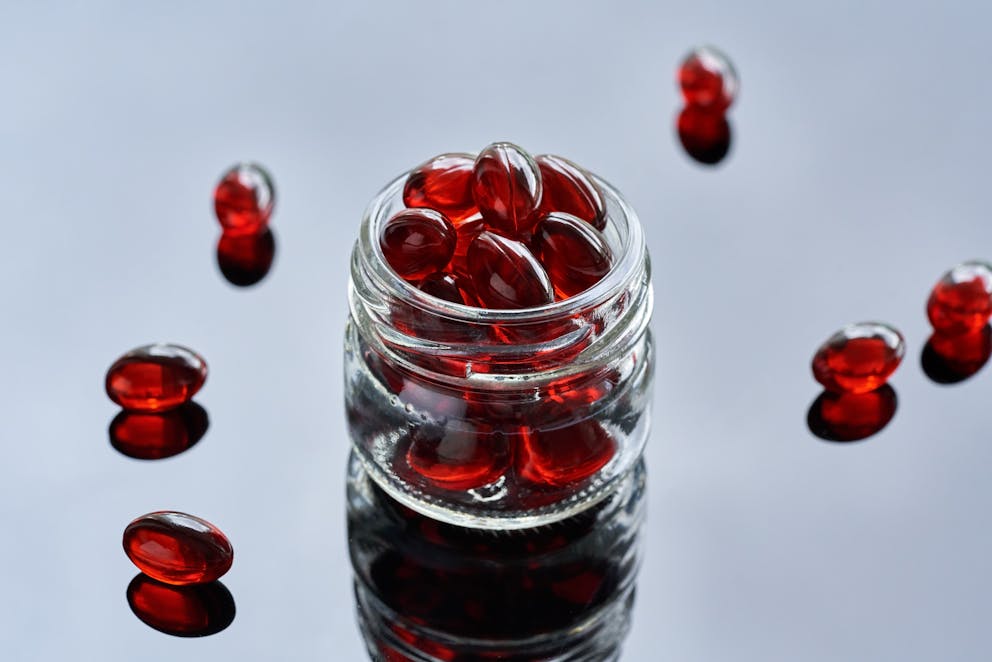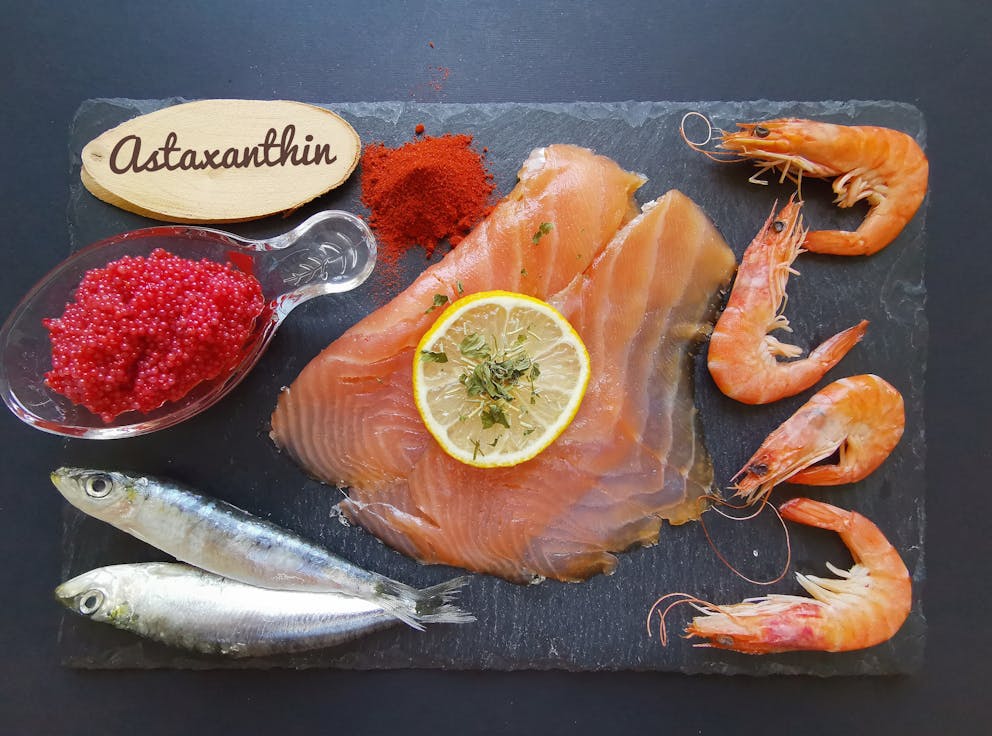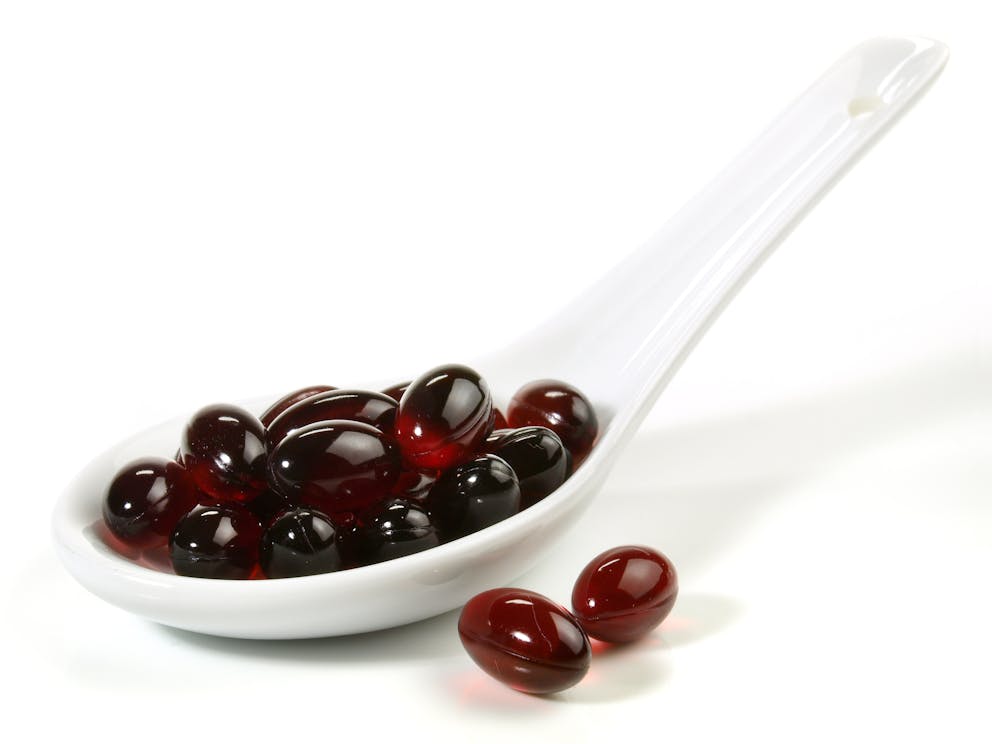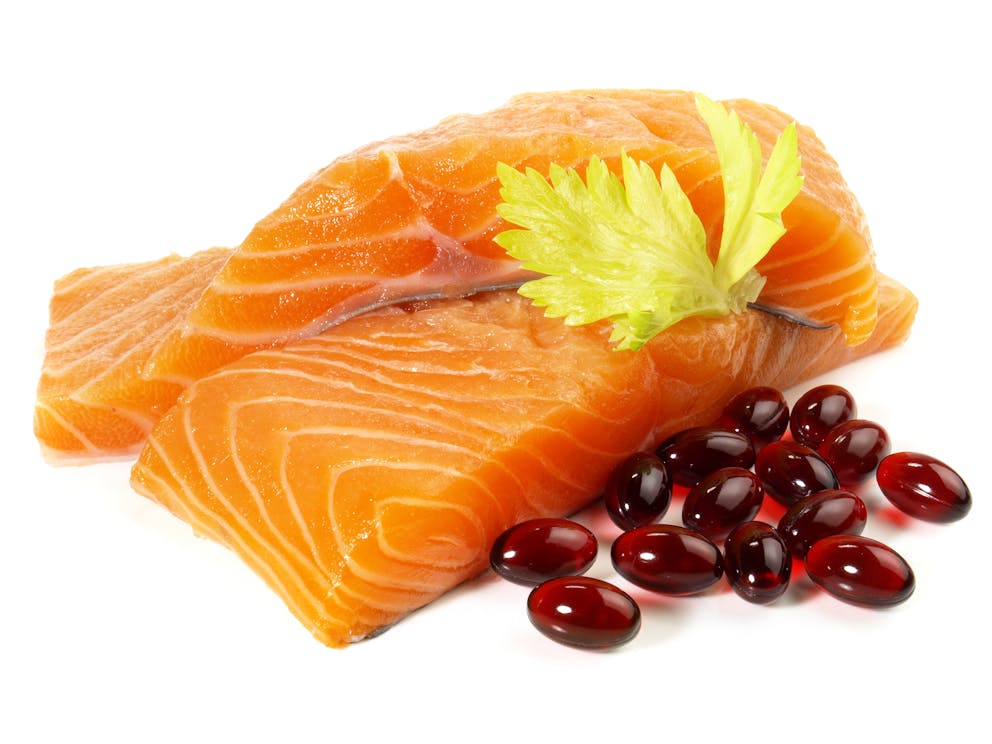7 Incredible Astaxanthin Benefits
Astaxanthin, a carotenoid primarily found in marine life, has potent antioxidant properties.
This natural pigment is responsible for the deep red hue of certain seafood and has been linked to health advantages, including cardiovascular health and improved athletic performance.
Discover seven amazing astaxanthin benefits and learn how to incorporate this powerful antioxidant into your diet.

What is astaxanthin?
Astaxanthin is a natural pigment, similar to chlorophyll and beta-carotene, which gives plants their green, orange, or yellow coloring.
Unlike other carotenoids, astaxanthin is primarily produced by a microalgae species known as Haematococcus pluvialis. Marine life feeds on this algae, giving fish and crustaceans like salmon and lobster a bright red hue.
Astaxanthin is a powerful antioxidant that protects cells from the harmful effects of free radicals linked to exposure to pollution, poor dietary habits, and chronic stress.
Free radicals, also known as reactive oxygen species (ROS), are unstable molecules that damage cellular components, including DNA.
An imbalance between free radicals and antioxidants can cause oxidative stress, a major factor in various chronic diseases, such as cancer, cardiovascular issues, and neurodegenerative conditions.
Watch the video below to learn more about astaxanthin, its sources, and its impressive health benefits.
7 health benefits of astaxanthin
Astaxanthin’s antioxidant activity is significantly greater than many other dietary antioxidants, including beta-carotene, vitamin E, and vitamin C.
This makes astaxanthin an excellent choice for promoting overall health and combating oxidative stress-related damage in the body.
Here are seven health benefits of astaxanthin.
1. Helps support healthy skin
Astaxanthin may reduce skin damage and support healthy skin barrier function by reducing the harmful effects of ultraviolet (UV) radiation. Excessive UV exposure can break down collagen, leading to premature aging, wrinkles, and dark spots.
A study published in Nutrients found that astaxanthin supplementation reduced UV-induced skin deterioration while improving skin texture, appearance, and moisture content.
2. Lowers the risk of heart disease
Prolonged periods of high blood sugar can damage the heart’s blood vessels, increasing the risk of heart disease.
Research published in the Journal of Functional Foods found that the antioxidant astaxanthin can positively affect glucose metabolism, linked to better blood sugar control and cardiovascular health.
In addition, astaxanthin has also been found to promote a balanced lipid metabolism, which has been linked to a lower risk of atherosclerosis, a leading cause of heart attacks and stroke.
3. Enhances cognitive function
Preserving cognitive function is essential for aging people susceptible to neurodegenerative diseases that can lead to forgetfulness, memory loss, and mood changes.
A study published in Frontiers in Pharmacology showed that astaxanthin has neuroprotective effects, potentially offering therapeutic properties in those with age-related cognitive decline, Alzheimer’s disease, and epilepsy.
Astaxanthin can cross the blood-brain barrier, an important layer of tissue that supplies the brain with nutrients. Once inside the central nervous system, astaxanthin can help reduce oxidative damage and inflammation, which supports brain health and helps lower the risk of neuronal issues.

4. Promotes eye health
Blurred vision is a common sign of aging and overexposure to blue light.
Astaxanthin's powerful anti-inflammatory and antioxidant properties may reduce the risk of macular degeneration, a form of retina damage associated with blind spots, and central vision loss.
“Astaxanthin can help prevent chronic cellular degeneration, especially within the eyes, which can reduce the risk of macular degeneration and cataracts,” explains Dr. Berg.
A study published in Free Radical Research found that astaxanthin reduced oxidative stress in the ocular photoreceptors and prevented retinal degeneration from blue light.
5. Strengthens the immune system
Astaxanthin can help maintain immune health and activate white blood and natural killer cells. These crucial immune cells produce antibodies that detect and eliminate invasive bacteria and viruses and help destroy damaged and dysfunctional cells linked to a lower risk of cancer.
Research published in Foods found that astaxanthin promotes the production of antibodies and enhances the body’s ability to recognize and protect against foreign microorganisms.
6. Promotes liver function
Astaxanthin may also reduce oxidative stress in the liver and promote optimal liver function by lowering inflammation in liver cells.
A study published in Drug Design, Development, and Therapy showed that astaxanthin had therapeutic benefits for various liver-related diseases, including liver fibrosis, non-alcoholic fatty liver, and liver tumors.
7. May boost athletic performance
Though more research is needed in humans, animal research found that astaxanthin may boost endurance, reduce fatigue, and lower the risk of exercise-induced muscle damage in athletes.
A review published in Frontiers in Nutrition states, “Research conducted in animal models provides evidence to support the use of astaxanthin as a dietary supplement for recreationally active individuals and athletes.”

Sources of astaxanthin
Astaxanthin is abundant in freshwater and saltwater microalgae species, including Haematococcus pluvialis, Chlorella zofingiensis, and Chlorococcum.
However, the most available natural sources of astaxanthin for humans are found in the marine wildlife that consumes these aquatic microorganisms.
Astaxanthin-rich foods include:
Wild Pacific sockeye salmon
Red trout
Lobster
Shrimp
Crayfish
Crabs
Krill
Wild-caught fish and crustaceans contain higher levels of astaxanthin than farm-raised ones, making them the best options for promoting the body’s antioxidant defenses.
According to a study published in Environmental Health Perspectives, farm-raised fish contains more contaminants, including pesticides, dioxins, toxaphene, and dieldrin, which are linked to cancer and other health risks.
Additionally, farm-raised fish are more susceptible to diseases and are often treated with antibiotics, which is linked to an increased risk of antibiotic resistance in humans.
In addition, astaxanthin is also available in supplemental form and is a convenient option to promote a healthy body and overall well-being.

Possible downsides
Consuming astaxanthin in seafood is safe for most people. However, those allergic to seafood are at risk of symptoms such as swelling, itchiness, or throat tightness and should avoid obtaining astaxanthin from natural sources.
A statement released by the Food and Drug Administration (FDA) declared astaxanthin supplementation generally recognized as safe (GRAS) when taken in small doses.
However, supplementing with high doses of astaxanthin has been associated with an increased risk of stool discoloration, increased bowel movements, and stomach pain.
Who shouldn’t take astaxanthin supplements?
Astaxanthin supplementation may cause adverse reactions in individuals with certain health concerns or those taking prescription medication.
Astaxanthin can lower blood pressure, increasing the risk of dangerously low blood pressure in those taking hypertensive drugs.
Additionally, pregnant or breastfeeding women should also avoid astaxanthin, as data is limited on its effects on unborn and breastfeeding babies.
Though astaxanthin supplements are considered safe, it’s crucial to consult a healthcare provider before taking astaxanthin if you have preexisting health conditions or are taking prescription medications.

How much astaxanthin can you take?
Those who don’t have access to quality seafood can supplement with natural astaxanthin extract or krill oil.
Astaxanthin supplements are generally taken in doses of between 4 and 12 milligrams, taken once or twice daily.
It’s crucial to opt for astaxanthin extract derived from algae rather than synthetic sources and take it with meals to enhance its absorption.
Astaxanthin is also naturally present in krill oil, and a common dosage is around one gram per day, typically taken with food.
To minimize the risk of side effects, it’s important to carefully follow the instructions of the astaxanthin or krill oil supplement you plan to use.

Key takeaways
Astaxanthin, a carotenoid with powerful antioxidant properties, is produced by microalgae and eaten by marine life. This makes lobster, salmon, and crabs all excellent sources of this health-promoting nutrient.
Studies show that astaxanthin benefits various crucial physiological functions, including immune defenses, skin barrier integrity, and vision while lowering the risk of heart disease and cognitive decline.
FAQ
1. What are the top astaxanthin benefits?
Astaxanthin’s antioxidant properties are credited with its various benefits, including promoting eye, brain, and heart health. Astaxanthin may also reduce ultraviolet (UV) skin damage and support optimal immune functions while boosting athletic performance and recovery.
2. What happens if you take astaxanthin every day?
Daily astaxanthin supplementation is generally considered safe in doses between 4 to 12 milligrams and is associated with enhanced brain, eye, and skin health. However, high doses of astaxanthin can lead to red stools, diarrhea, and stomach pain.
3. Who shouldn't take astaxanthin?
Those who are on blood pressure medication, pregnant, or breastfeeding should avoid taking astaxanthin supplements.
Astaxanthin can lead to dangerously low blood pressure levels in those taking hypertensive drugs, and there is a lack of safety data for unborn or breastfeeding babies.
4. How much astaxanthin should I take?
It’s recommended to take between 4 and 12 milligrams of astaxanthin once or twice daily. Astaxanthin supplements are fat-soluble and should be taken with food to enhance absorption.
5. What are the best natural sources of astaxanthin?
Astaxanthin is naturally produced in microalgae eaten by marine life, including wild sockeye salmon, shrimp, lobster, and crab. In addition, krill, crayfish, and red trout are also rich sources of astaxanthin.
6. Which is better, CoQ10 or astaxanthin?
Astaxanthin is considered one of the most potent antioxidants, absorbing more free radicals than alpha lipoic acid, vitamin C, and coenzyme Q10 (CoQ10). Astaxanthin antioxidant properties are reportedly 800 times greater than that of CoQ10.
Sources
Previous blog
What Is TamoxifenNext blog
Amazing OnionsTags

Popular
08/21/2024
40.4K views
05/22/2024
36.9K views
08/19/2024
214.9K views
03/18/2024
11/21/2022




